Photo
i’m incapable of choosing a single favorite but The Space Between Worlds by Micaiah Johnson and Winter’s Orbit by Everina Maxwell are both up there!!
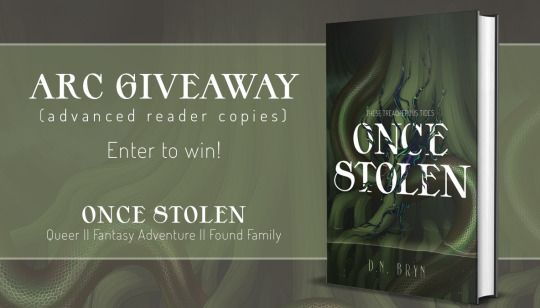
To celebrate three weeks until Once Stolen’s release, I’m giving away a paperback copy!
An autistic naga thief must guide a poisoned hero through the homeland that banished him while fleeing cartel leaders, swamp monsters, and his own feelings.
This is a queer, fast-paced fantasy adventure with found family and a banter-filled romance between flawed opposites who help each other grow. Highlights include a soft dad Disney villain and spiteful insults turning into affectionate insults.
To enter you must do both:
Reblog this post!
And comment on this post with your favorite queer book!
Any reblogger who doesn’t comment will be counted as a boost.
Giveaway ends on July 12th.
* Paperbacks are available only in certain countries based on shipping and giveaway laws. No matter where you live, you can still receive an ebook copy if a paperback is unavailable to you, or if you prefer ebook format. (A paperback winner will be drawn again if the original winner chooses an ebook instead.)
You can also learn more about Once Stolen and read the first chapter, pre-order to get pre-order gifts, or add on goodreads.
#arc giveaway#i will not admit how long i spent debating which book to comment about#*deletes tags about all the other books that crossed my mind*
218 notes
·
View notes
Text
Having the woman your male mc is threatening at the beginning of your novel be like “please don’t hurt me! I have a wife!” is not the inclusive move you think it is
#writing#books#I was going to let this go but I just can't get over that this author really thought#a woman in a dangerous situation would out herself??? and possibly risk further violence????#homophobia#queer rep#anyway if you're like 'I know what unnamed side character should be lgbtq! the one threatened with violence!" maybe... reconsider#also hey guess what i'm not dead and might start using this account more :D
2 notes
·
View notes
Text
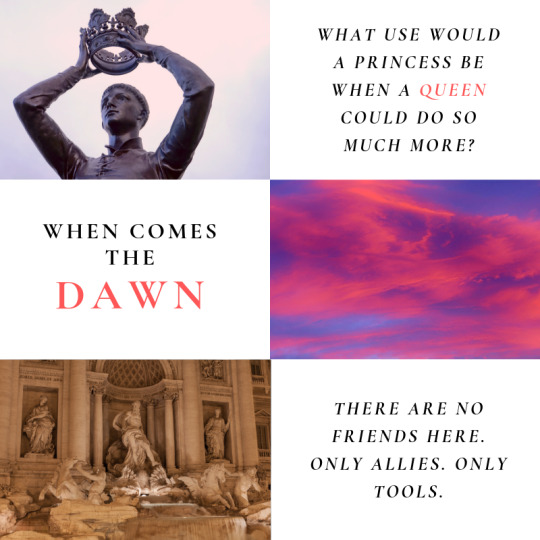
//Wip Introduction
Title: When Comes the Dawn (working title, may change later)
Genre: Historical/Fantasy
Status: 1st draft/fleshing out plot & characters
POV: 3rd person
Themes: Family | Loyalty | Courtly Intrigue | Betrayals | Conflicting Ideologies | Moral Ambiguity | Jealousy | Power | War
Synopsis: In a world where everyone can use, or has the potential to use magic, Princess Fenice vi Aetier was born to two powerful magic users with the hopes of balancing the scales of power in favor of the Kingdom of Aetier. However, unforeseen complications during her mother’s pregnancy caused Fenice to enter the world as a deadborn—a child who is incapable of using magic— and leaving her mother infertile, which led to her parents’ divorce and mother and daughter’s subsequent self-imposed exile away from the capital.
Almost a decade later, Fenice’s stagnant life comes to an end when she unwittingly participates in her mother’s assassination. With her only guardian being her father, the king, Fenice is forced to enter the world of intrigue, secrecy, and courtly politics. But even her royal birth and her father’s protection means nothing when her very existence paints a bright red target on her back.
The new Queen and her faction see Fenice as a possible contender for the throne and a threat to her younger half-brother Prince Charles’ position as heir apparent. Religious sects view Fenice as an abomination of the natural order and wish to either condemn or eliminate her. Others, meanwhile, seek to place Fenice on the throne she was denied since birth; an attempt to create a puppet king to enforce their interest.
With danger looming all around her, Fenice decides to take her own destiny by the reins. Whether it would be rooting out her mother’s assassins, supporting her father in his quest to unite the feuding states and kingdoms of Raia, or simply finding a way to keep herself alive, Fenice will shape her destiny with her own hands.
More details will be posted on my wip page, if you’d like to take a look. I’ll be posting updates/information about this wip under the tags #WCTD, #wip:WTCD or #whencomesthedawn so be on the lookout! If you’d like to be on my tag list, please send an ask/message me anytime (^0^)
14 notes
·
View notes
Note
What sort of questions should I be asking my beta readers?
QUESTIONS TO ASK YOUR BETA READERS:
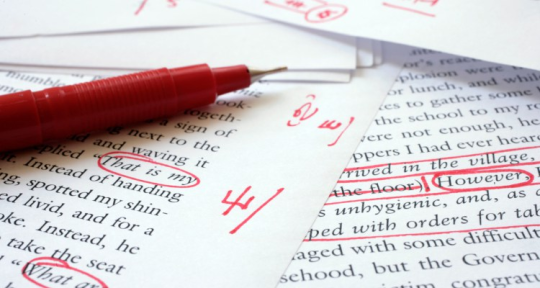
When I send out my chapter to be read over by my beta readers, I always include a set of questions typed out at the bottom, grouped into different categories such as: plot, pacing, character, setting, etc.
You might want to tailor the questions depending on the genre or which chapter it is. For example, if it’s the first chapter you’ll want to ask them about how well your story managed to hook them, or if they managed to easily get an idea of the world you’ve introduced them to. If it’s the climax you might want to ask if the action scenes are fluid, and if the plot twist/s were predictable or surprising.
Here’s some example questions that you could use:
Opening Chapter:
What is your first impression of the main character? Do you find them likable? Annoying? Boring?
After reading it for the first time, what is your first impression? Was it cohesive and compelling? Boring and confusing?
Did the first sentence/paragraph/page efficiently grab your attention and hook you in?
If you were to read this chapter in a bookstore/library would you be convinced to buy it? Or would you need to read further before deciding? Why or why not?
Did you get oriented fairly quickly at the beginning as to whose story it is, what’s going on, and where and when it’s taking place? If not, what were you confused about at the beginning?
Does the first chapter establish the main character efficiently? Do they feel believable?
Characters:
Could you clearly imagine what the characters looked like? If not, who?
Who was your favourite character and why? Has your favourite character changed? (if this hasn’t changed feel free to skip this question)
Are there any characters that you do not like? Why do you not like them? (Boring, annoying, problematic, etc.)
Was there ever a moment when you found yourself annoyed or frustrated by a character?
Could you relate to the main character? Did you empathise with their motivation or find yourself indifferent?
Were the characters goals/motivations clear and understandable?
Did you get confused about who’s who? Are there too many characters to keep track of? Are any of the names or characters too similar?
Do the characters feel three-dimensional or like cardboard cutouts?
How familiar have you become with the main characters? Without cheating could you name the four main characters? Can you remember their appearance? Can you remember their goal or motivation?
Dialogue:
Did the dialogue seem natural to you?
Was there ever a moment where you didn’t know who was talking?
Setting/world-building:
Were you able to visualize where and when the story is taking place?
Is the setting realistic and believable?
How well do you remember the setting? Without cheating, can you name four important settings?
Genre:
Did anything about the story seem cliche or tired to you? How so?
Did anything you read (character, setting, etc.) remind you of any others works? (Books, movies, etc.)
Plot/pacing/scenes:
Do you feel there were any unnecessary scenes/moments that deserved to be deleted or cut back?
Do the scenes flow naturally and comprehensively at an appropriate pace? Did you ever feel like they were jumping around the place?
Was there ever a moment where you attention started to lag, or the chapter begun to drag? Particular paragraph numbers would be very helpful.
Did you ever come across a sentence that took you out of the moment, or you had to reread to understand fully?
Was the writing style fluid and easy to read? Stilted? Purple prose-y? Awkward?
Did you notice any discrepancies or inconsistencies in facts, places, character details, plot, etc.?
Additional questions:
What three things did you like? What three things did you not like?
Can you try predicting any upcoming plot twists or outcomes?
Was there ever a moment when your suspension of disbelief was tested?
Is there anything you’d personally change about the story?
Was the twist expected or surprising? Do you feel that the foreshadowing was almost nonexistent, or heavy handed?
Feel free to tailor these to your needs or ignore some of them if you don’t think they’re useful. Basically, your questions are about finding out the information about how others perceive your own writing and how you can improve your story.
Have a question you want answered?
22K notes
·
View notes
Text
I love characters that are completely harmless until they finally unleash their power and then they’re TERRIFYING
155K notes
·
View notes
Text
I’m about to lay down the best writing advice y’all’ve ever heard:
sometimes people just won’t like your work, and that’s okay. it doesn’t mean your work sucks, it doesn’t mean you suck, and it doesn’t mean they’re tasteless or a bad person for not liking something you made. sometimes people just don’t like things for whatever reason.
like, i don’t like American Gods. everyone likes this book, everyone i talked to liked it, my mom recommended it, and i couldn’t even finish it. i don’t think it’s a bad book or that Neil Gaiman is a bad writer, it just didn’t click with me. and that’s fine. and for everyone who doesn’t like what you write, someone will. ok? ok
3K notes
·
View notes
Text
When Your Plot Hits a Dead End

Anonymous asked:
How would you say you manage to push forward a plot when it seems to hit a dead end or just lack ideas afterwards? I’ve been writing an outline and struggling what to do at a certain point in the story for several weeks now.
If you’re struggling with a small plot point, something in between other plot points, or are just having trouble strategizing, try these brainstorming tips.
If you have the first portion of the story, and can’t figure out the rest, then I have one word for you: Goals.Goals. Goals. Goals. Goals. Goals. Goals. Goals. Goals.
If you want to know where your story needs to go,
you first need to know what your protagonist wants.
If they don’t want anything yet, then give them something to want. Something they need to prevent, something they need to earn, something they need to save. Give them something difficult to accomplish.
Remember that all (genre) stories need to reach a final climactic moment in which your protagonist makes the choice to change as a person (or to stay the same) and finally achieves (or loses) the thing they wanted most.
Frodo brings the ring to Mount Doom.
Luke blows up the death star.
Harry Potter kills Voldemort.
The Beauty gets to be with her Beast.
Once you know where your story needs to go,
you can figure out how to get it there.*
Prior to these final climactic moments is the middle section of the book, made primarily of hurdles being thrown in your character’s way in order to…
(a) Block your protagonist from their goal.
(b) Make your protagonist learn and develop.
© Build up the tension until the final climactic moment.
These hurdles can be anything from finely woven subplots that tie everything together in a great plot twist at the end, to random junk you wanted to see your characters react to. Along with each hurdle, it’s important to make sure your characters get something out of it too, giving them a reason to believe they can reach their goal if they keep moving forward.
A not-at-all complete list of ways to create hurdles:
Subplots. Make your protagonist deal with a subplot when they really want to be reaching for their goal instead.
Take something away. Take away something your protagonist already has and either wants very badly to keep, or specifically needs to survive.
Stepping stones. Provide a series of tasks your protagonist needs to get through in order to have the tools to accomplish their goal.
Questing. Make your protagonist travel a long way to achieve their goal, thus giving them time to run into all sorts of nasty problems.
Minor villains. Give your protagonist a distraction in the form of minor antagonistic characters.
Major villains. Let the main antagonist rear it’s almighty head, whether this be a person or organization who wants to take down your protagonist, a natural disaster threatening their life or well being, a destructive part of your protagonist’s self, or something else entirely.
Inconveniences and disadvantages. Remove or greatly hinder your protagonist’s ability to do the thing they were already planning to do.
Redirection. Give your protagonist a brand new goal they now need to achieve, either instead of, or on top of, their old one.
You can create hurdles for your protagonist to overcome in any number of other ways. (Again, if you’re having writer’s block when trying to create these, check out the brainstorming tips. You can also learn more about creating strong plot points here.)
In the end though, the key is simply to have a protagonist who wants something and to make them overcome obstacles in order to reach it.
* If you’re already working on an outline, you’re probably the type of person who likes knowing the details ahead of time. But you don’t need to have all the details for this to work. Sometimes it’s enough just to know the protagonist needs to fight the antagonist, or save the city, or stop the love interest from leaving, even if you aren’t sure how they’ll do that yet.
Some random, related FAQ under the cut:
Keep reading
2K notes
·
View notes
Text
Morally Grey But Still Likable?
Writing morally grey characters readers will love.

@coinsanddeadlypoisons asked:
Do you have any tips about writing from the point of view of a manipulative character? I don’t want him to be an asshole but i am afraid the readers would see him as such.
The large majority of the characters in The Warlord’s Contract are morally grey in one way or another, with one in particular being rather manipulative, and I’ve found that the same basic principles and tricks apply to them all, no matter which negative “asshole” attributes they exhibit.
1. Why do they do what they do?
Readers will forgive most morally gray actions if they feel the character has a good reason for it. This reason can be anything number of things, often compounded. These include, but are not limited to:
The character’s goal is worth the sins they commit in the process.
Their past has conditioned them to do what they do.
They believe that they (or someone else) will suffer if they don’t.
They believe everyone else is already doing the same and they’re evening the playing field.
They believe their actions will benefit others in the long run.
They’re convinced they’ll be hurt if they don’t do it.
The reason(s) you character has do doing what they do should also make sense within the context of the story itself. Thematically, it should match or mirror other cause and effect situations you’re presenting, and it should fit (and often intertwine) with the character’s backstory and personality.
Keep reading
8K notes
·
View notes
Text
20 Basic Plots
1. QUEST - the plot involves the Protagonist’s search for a person, place or thing, tangible or intangible (but must be quantifiable, so think of this as a noun; i.e., immortality).
2. ADVENTURE - this plot involves the Protagonist going in search of their fortune, and since fortune is never found at home, the Protagonist goes to search for it somewhere over the rainbow.
3. PURSUIT - this plot literally involves hide-and-seek, one person chasing another.
4. RESCUE - this plot involves the Protagonist searching for someone or something, usually consisting of three main characters - the Protagonist, the Victim & the Antagonist.
5. ESCAPE - plot involves a Protagonist confined against their will who wants to escape (does not include some one trying to escape their personal demons).
6. REVENGE - retaliation by Protagonist or Antagonist against the other for real or imagined injury.
7. THE RIDDLE - plot involves the Protagonist’s search for clues to find the hidden meaning of something in question that is deliberately enigmatic or ambiguous.
8. RIVALRY - plot involves Protagonist competing for same object or goal as another person (their rival).
9. UNDERDOG - plot involves a Protagonist competing for an object or goal that is at a great disadvantage and is faced with overwhelming odds.
10. TEMPTATION - plot involves a Protagonist that for one reason or another is induced or persuaded to do something that is unwise, wrong or immoral.
11. METAMORPHOSIS - this plot involves the physical characteristics of the Protagonist actually changing from one form to another (reflecting their inner psychological identity).
12. TRANSFORMATION - plot involves the process of change in the Protagonist as they journey through a stage of life that moves them from one significant character state to another.
13. MATURATION - plot involves the Protagonist facing a problem that is part of growing up, and from dealing with it, emerging into a state of adulthood (going from innocence to experience).
14. LOVE - plot involves the Protagonist overcoming the obstacles to love that keeps them from consummating (engaging in) true love.
15. FORBIDDEN LOVE - plot involves Protagonist(s) overcoming obstacles created by social mores and taboos to consummate their relationship (and sometimes finding it at too high a price to live with).
16. SACRIFICE - plot involves the Protagonist taking action(s) that is motivated by a higher purpose (concept) such as love, honor, charity or for the sake of humanity.
17. DISCOVERY - plot that is the most character-centered of all, involves the Protagonist having to overcome an upheavel(s) in their life, and thereby discovering something important (and buried) within them a better understanding of life (i.e., better appreciation of their life, a clearer purpose in their life, etc.)
18. WRETCHED EXCESS - plot involves a Protagonist who, either by choice or by accident, pushes the limits of acceptable behavior to the extreme and is forced to deal with the consequences (generally deals with the psychological decline of the character).
19. ASCENSION - rags-to-riches plot deals with the rise (success) of Protagonist due to a dominating character trait that helps them to succeed.
20. DECISION - riches-to-rags plot deals with the fall (destruction) of Protagonist due to dominating character trait that eventually destroys their success.
by Pavel Simakov
52K notes
·
View notes
Text
i feel like it says a lot about me that this is currently in my wip document

#sometimes you need that positivity#writing#writers on tumblr#mp#im finally tryin to be a bit more active on here again!!
1 note
·
View note
Text
Let’s Talk about Querying!
(And why I stopped querying my novel.)

As some of you know, I was querying Iron From Fire on and off from March through May, and I recently decided to quit, despite it being overall a good story written in what one editor described as ‘on par’ for the genre.
And I think it’s important to talk about the process I went through, because my ill preparation hurt my mental health a lot, and you all deserve to know how to avoid the same fate.
First, this is the general process of querying, in case anyone is unfamiliar:
You finish the manuscript. And I mean finish it. Beta rounds, line edits, formatting, the whole nine yards.
You write the query letter. This includes a blurb meant to draw the agent in, a paragraph with stats and the names of a couple contemporary books that resemble yours, and a short bio about your previous book-related experience.
You send the query letter to a bunch of agents. A positive request rate right now is somewhere around 6 or 7%, which means if you have a stellar manuscript then 7% of the agents you query will want to read more of it to see if they’re willing to represent you.
You receive a mixture of rejections and requests, with a lot of silence in between. Most rejections are form rejections so you have no idea why they didn’t like your manuscript. Some requests turn into delayed form rejections. Everything hurts.
You either get an agent who signs you or you decide to quit. If you have a book you think will sell and are having positive responses from agents, the general rule of thumb is to keep querying until you’ve sent a letter to every agent you’d be interested in working with. This can mean anywhere from 30 to 130 agents.
Putting the rest under the cut.
Keep reading for:
Why I quit.
The things I learned from querying.
What I would have done differently if I’d known better.
[While this has some rather personal mental health things, please feel free to reblog it so other writers can learn from my experience!]
Keep reading
870 notes
·
View notes
Photo
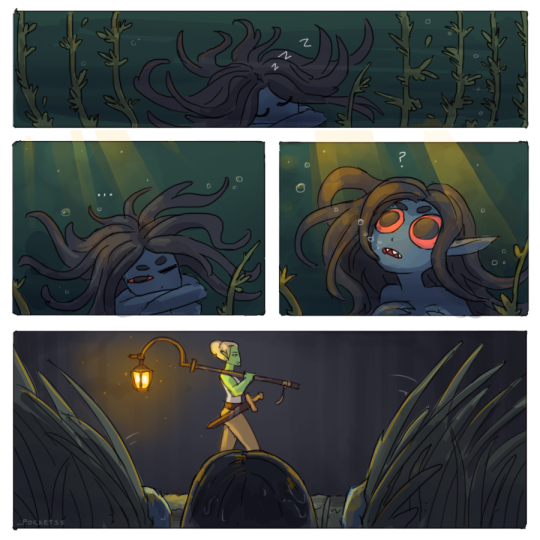


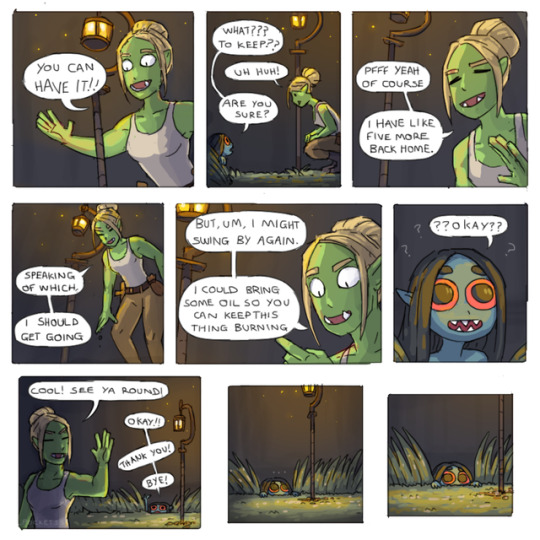
strange bog girl makes a friend
187K notes
·
View notes
Photo
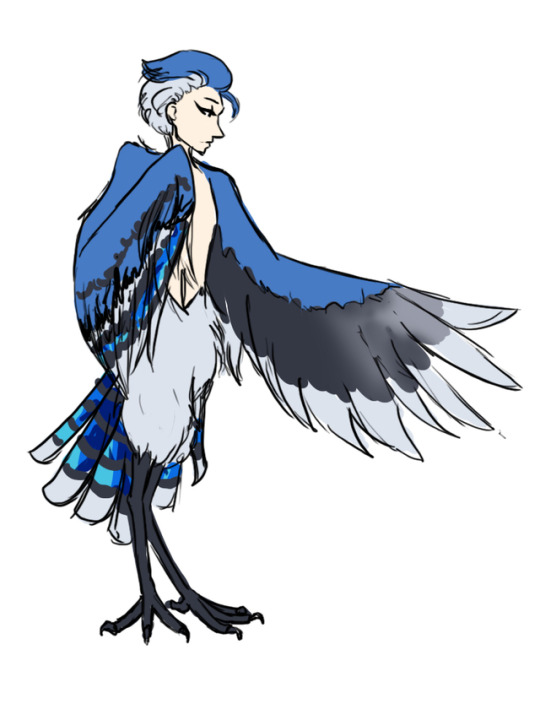
Blue Jay Bird Person
A harpy I guess. Based on a blue jay which is one of my favourite birds. Unfortunately it’s associated with baseball now around here. And that one cartoon character who’s name I forget.
73 notes
·
View notes
Text
Me trying to write characters who adhere to normal sleep patterns of ppl in their 20s has the same energy as me trying to write straight girls in a romance
“It’s late. 4 am. won't wake up till noon.”
“Yes. that's a man. love those.”
#writing problems#writing#obviously an exaggeration#but this is how it feels sometimes#also hi sorry i've been away! my semester ends soon and i hope to come back then!#ive got a new wip I'm super excited about!
2 notes
·
View notes
Text
not a favorite but its hard to find a snake more interesting than the brown tree snake!! It’s one of the craziest invasive species out there. It’s not too big, all brown, and from Indonesia--so not very striking at all until it got into Guam and completely decimated bird, small mammal, and herp populations there

There’s quite literally so few birds or other small animals left on Guam that researchers say it’s odd to hear a sound from the forests, and the brown tree snake has even been attributed with indirectly changing the composition of trees in the forests.
Guam has the highest density of snakes in the world because of them, and they cause power outages quite often too. Chicken farmers on Guam sometimes deal with dozens of snakes trying to get into coops.
So yeah, not a favorite but definitely an interesting animal!
I’m looking for inspiration! Who wants to share their favorite type of snake???
#snakes#interesting but v bad#its a catastrophe for people and the ecosystems#people go in and start removing birds to build captive populations#literally when the snake is found on a new island#theres just no way to stop it#this got long sorry about that
97 notes
·
View notes
Text
writing hack: if you write something long enough, your main character’s name alone counts for 1000+ words
#writing#writing meme#writing advice#Writing tips#writers on tumblr#i just finished smth thats about 80K and my protags name is 1633 of those#i disappeared for a really long time but im going to start trying to come back soon
8 notes
·
View notes
Text

I get a lot of people telling me they want to learn to sign, but not knowing exactly where to start. So, I am here to provide that! *Note: this was originally posted on another blog of mine, but I have since decided to move it to this one!
Let’s start off with some basics, though. ASL does NOT follow English grammar (Signed Exact English/SEE does, but it is not ASL), it only uses English words and a lot of the communication with singing is done via facial expression and body language. Basically, it goes in the order of time > topic > comment. For example, “ I am going to pet dogs next week” would be “next week dogs me pet”, but there are quite a few variants and every person who signs will have a different way of doing this. Sort of how people who speak English in different parts of America have an accent and different ways to sign things. The most important thing to note about ASL is that *American* Sign Language is not universal. Most languages have their own form of SL and a lot of the word signs/alphabets are not at all the same. Another note, learning SEE may seem easier at first, but it can actually make the transition to ASL grammar that much more difficult. An example of differing signs is BSL (British Sign Language) vs ASL.
This is the BSL finger alphabet:
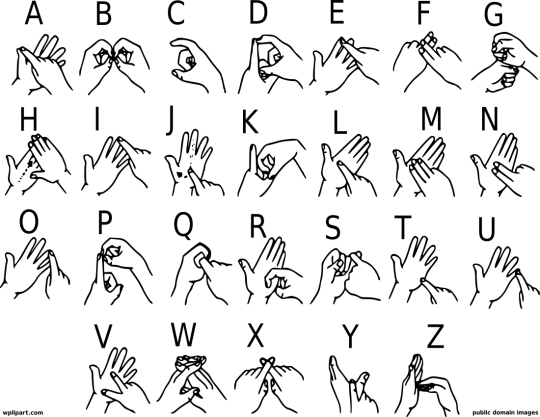
And this is the American one:

So while there is a small bit of crossover, it is very, very different! Don’t get me wrong, a lot of times signers will understand each other at least a little bit, but it does need to be noted that signs can differ by language, country, region, and sometimes person.
Now, onto what you came for…
Alphabet:
ASL Alphabet
ASL ABC’S (NON-CC VIDEO)
The ASL Alphabet
Deaf Culture:
*Note: if you are going to be attending Deaf events, please make sure you familiarise yourself with our culture!
American Deaf Culture
What is Deaf Culture?
The Importance of Deaf Culture
Deaf Culture vs Hearing Culture (NON-CC VIDEO)
Finger spelling:
American Sign Language Finger Spelling
Sign Word List for Finger Spelling
Learn ASL: The Finger Spelling Alphabet for Beginners (CC VIDEO)
ASL Finger Spelling Word Printer (gives you the finger spelling equivalent to what you type)!
Finger Spelling Practice
Sign Language Translator
Grammar:
ASL Grammar
The Basic Structure
Learn ASL Grammar (CC VIDEO)
Learn:
*Note: The best way to learn is through D/deaf people/other signers!
Lifeprint
SignLanguage101
The ASL App
100 First Signs (Lifeprint)
SigningSavvy
Misc:
A Day Through a Deaf Person’s Eyes (CC VIDEO)
Deaftube
What Questions Annoy Deaf People? (CC VIDEO)
Things Not to Say to a Deaf Person (CC VIDEO)
Why I Don’t Sound Deaf (CC VIDEO)
13 Things my Hearing Friends Should Know (CC VIDEO)
National Association of the Deaf
2K notes
·
View notes